Micro-festival Cultivating Humility | Kihkasik Anelsuwakon
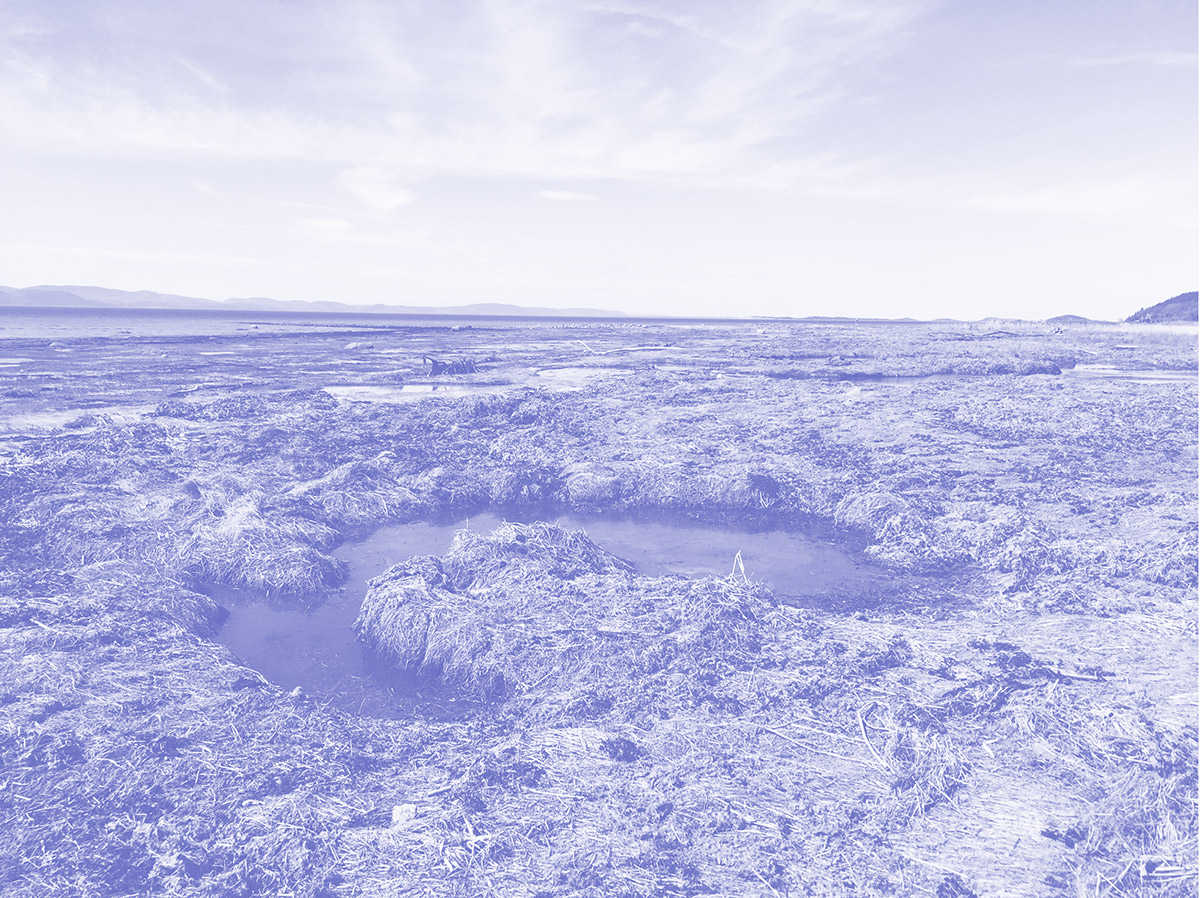
Artistic and community micro-festival organized in collaboration with VRillE | Art Actuel
Rivière-Ouelle
Saint-Germain-de-Kamouraska
La Pocatière
8 au 10 juillet 2022
FRIDAY – July 8 2022
Welcome
Word of welcome
Wolastoq amsqahs peciyat (Origin of the Wolastoq), screening of the animated film by Mélanie Brière (2019), with the director in attendance, and other short films
SATURDAY – July 9 2022
Les Jardins de la mer, Saint-Germain-de-Kamouraska
Ongoing
Micro-exhibition in La Vrille mobile
Jardins tinctoriaux, plant-dye workshop with Dahlia Milon
Word of welcome
La vie du sol, underground conversation with André Vézina, researcher, Biopterre
Piétiner ou ne pas piétiner ? De la phragmite à la salicorne, action-walk with Claudie Gagné, Les Jardins de la mer
La gravité organise les hasards. Ton cheveu a collé sur ma peau, performance by Maude Arès, artist, on the tidal flats
les fleurs que tu as jetées sont devenues les murs poreux de mon univers, performance by Annie France Leclerc, artist, on the tidal flats
Jardins tinctoriaux, plant-dye workshop with Dahlia Milon
Closing words
SUNDAY – July 10 2022
Micro-exhibitiob in La VRillE mobile
Word of welcome
Kihkan | Jardin, rencontre avec Pierre Morais, encounter with Pierre Morais, culture consultant for the Wolastoqiyik Wahsipekuk First Nation
Trajectoire, move to a cave in College Mountain (about 600 metres)
Corps roca, performance by Ileana Hernandez, artist, in a cave
La vie minérale, conversation about geology with Emmanuel Caron-Garant, biologist, Biopterre
Trajectoire, move to the entrance to Le Jardin Floral (about 600 metres)
Micuwakon | Nourriture, sharing of a traditional snack and territorial acknowledgment ceremony with Pierre Morais, cultural consultant for the Wolastoqiyik Wahsipekuk First Nation
Cultivating Humility | Kihkasik Anelsuwakon is an artistic and community adventure that transports us into an encounter with the plant world. Articulated around questions that are part of the daily life of people living in the Kamouraska region and Wolastoqey territory, as well as of visual artists, this micro-festival is an invitation to look at plants from the viewpoint of their interdependence with the living and non-living beings around them and to revisit our own relationship with them. Along tidal fats, in forests, and in the farmland that is a notable feature of the region’s landscape today, Cultivating Humility offers encounters with people from many different places who hold and transmit knowledge related to flora.
A three-day program of practical and creative activities offers an opportunity to experience different aspects of our relationship with plants, by using them to make utilitarian objects, observing the environments that we share with them, and tasting, listening to, telling stories about, or honouring them.
This event, organized as part of ORANGE, taking place in Saint-Hyacinthe and Odanak during the summer of 2022, envisions art as open to a plurality of practices, knowledges, and ways of learning. For this third edition of ORANGE in the Kamouraska region, activities on Saturday will take place at Jardins de la Mer, in Saint-Germain-de-Kamouraska, and the Sunday activities will be held at Jardin floral de La Pocatière. But first, an opening get-together will take place on Friday evening at La Baleine endiablée in Rivière-Ouelle.
We welcome everyone who shares a unique relationship with plants, whether it is contemplative, artistic, spiritual, utilitarian, or nutritional!
Elise Anne LaPlante – Véronique Leblanc
In close collaboration with Mélissa C Pettigrew, VRillE | Art actuel and Claudie Gagné, Dahlia Milon, Caroline Pigeon, André Vézina.
Advisory committee for the Cultivating Humility | Kihkasik Anelsuwakon Micro-festival
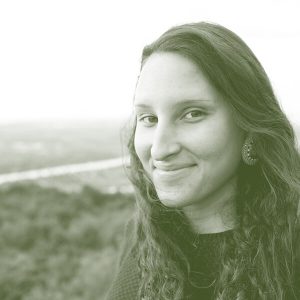
Mélanie Brière
Producer, director, and activist Mélanie Brière has produced and directed feature-length and short films and awareness-raising works for Wapikoni mobile. She produced Wapikoni’s first creative residency, hosting four emerging artists each of whom directed a film on the theme of revitalization of languages, as part of the International Year of Indigenous Languages (2019). In 2017, she was the ambassador for Mikana, an organization raising awareness of Indigenous realities, and sat on the diversity and inclusion committee of the Association québécoise de la production médiatique. In November 2021, she joined the Francophone documentary studio of the NFB as associate producer. Mélanie is Québécoise and a member of the Wolastoqiyik Wahsipekuk First Nation, formerly known as the Malécite de Viger First Nation.
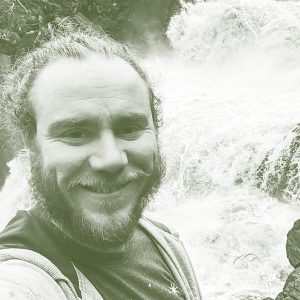
Emmanuel Caron-Garant
Emmanuel Caron-Garant has been a research professional for Biopterre since 2017. His university studies in ecology and geography deepened his interest in all facets of the world that we live in and that lives in us. From DNA to caviar to the ontogenesis of monadnocks to the microbiota of blackflies, his research subjects are as varied as his personal passions. You may see him one day practising one of his avocations – poly-instrumental musician, anarchist poet, or amateur archaeologist – willingly lost in his endless trove of reveries.
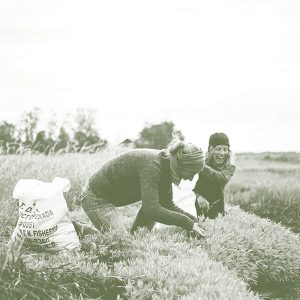
Claudie Gagné
It was in 1997 that Claudie Gagné (Les Jardins de la Mer) first cut the top off a sea asparagus, under the supervision of François from Les Jardins Sauvages. She happily took a first, crunchy bite of the plant, her eyes bright with joy as she tasted the salt and the water … the sea! That evening, sitting at a campfire, she realized how important the day had been: she had just learned something that would change her life. It was the beginning of a great adventure! That’s what destiny should be like! And since then … 25 seasons have passed, and Claudie is still walking the shores of the Kamouraska region to gather salt herbs. Thousands of steps on the tidal flats, long hours on her knees, her hands green with abundance. Freedom and gratitude to our great Magtogoek River. Everything flows from it.
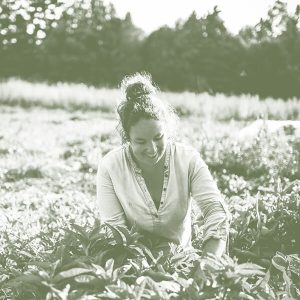
Dahlia Milon
Dahlia Milon Textile is an artisanal workshop specialized in making plant dyes and growing tinctorial plants. To prepare its dyes, the workshop uses mainly plants from its own garden, and it also harvest wild plants in the Kamouraska region, where it is situated. To contribute in its way in the changes needed for the textile industry to become more ecological, Dahlia Milon Textile has taken on the mission of making high-quality local tinctorial plants available to the public.
André Vézina
André Vézina holds a bachelor’s degree in forestry engineering and a master’s degree in forest management. After a nine-month internship on the windbreak hedges at INRA d’Avignon, he was an agricultural environment professor at ITA de La Pocatière from 1985 to 2018. During this period, he spent a great deal of time developing windbreak hedges and riparian strips in eastern Canada (www.wbvecan.ca), producing a hundred publications and presentations, supervising almost 1,000 plantation projects, and contributing to many scientific studies on the subject. Since 2018, he has been an agro-forestry consultant and research professional at Biopterre, the centre for bioproduct development.
